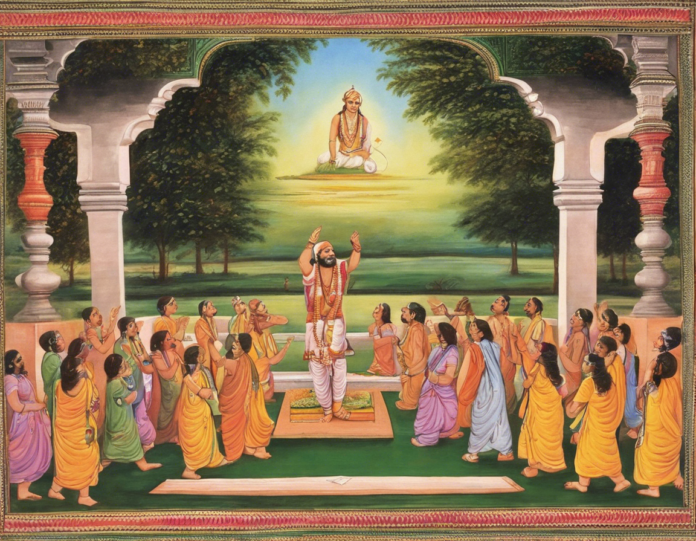Born in 1532 in Rajpur, a village in present-day Uttar Pradesh, Tulsidas was a saint, poet, philosopher, and reformer who made a significant impact on Indian literature and spiritual thought. His life story is a remarkable journey of devotion, perseverance, and divine inspiration that continues to inspire millions of people to this day. In this blog post, we will explore the life of Tulsidas, his literary works, and his profound influence on Indian culture and society.
Early Life and Education
Tulsidas, originally named Rambola, was born to Hulsi and Atmaram Dubey in a Brahmin family. From a young age, he showed a deep interest in spirituality and devoted his time to worship and meditation. Despite his early inclination towards spiritual pursuits, Tulsidas was married to Ratnavali as per his parents’ wishes. However, his marriage did not deter him from his spiritual path.
After a few years of married life, Tulsidas renounced the material world and set out on a pilgrimage to various holy sites. During his travels, he met several saints and sages who guided him on his spiritual journey. Tulsidas’s encounters with these enlightened beings had a profound impact on his beliefs and philosophy, shaping his future as a poet and philosopher.
Influence of Lord Rama and Composition of the Ramcharitmanas
Tulsidas’s devotion to Lord Rama was unwavering, and he soon became an ardent devotee of the deity. His deep reverence for Lord Rama inspired him to compose the epic poem Ramcharitmanas, which narrates the life and teachings of Lord Rama. Written in Awadhi, a dialect of Hindi, the Ramcharitmanas is considered one of the greatest works of Indian literature.
The Ramcharitmanas is divided into seven Kands (sections) and consists of over 10,000 verses. Tulsidas’s poetic rendition of the Ramayana story captured the essence of devotion, righteousness, and moral values, making it accessible to the common people. The Ramcharitmanas has since become a central text in the Bhakti movement and continues to be recited in homes and temples across India.
Tulsidas’s Legacy and Impact on Indian Culture
Tulsidas’s contributions to literature, philosophy, and spirituality have left an indelible mark on Indian culture. His writings not only enriched the literary landscape of India but also instilled moral values and ethical principles in society. Tulsidas’s emphasis on devotion, righteousness, and dharma (duty) continues to resonate with people of all ages and backgrounds.
Apart from the Ramcharitmanas, Tulsidas composed several other works, including the Hanuman Chalisa, Vinaya Patrika, and Kavitavali, each showcasing his poetic genius and philosophical insights. His teachings on love, compassion, and service to humanity have inspired generations of people to lead a life of virtue and spiritual fulfillment.
Tulsidas’s devotion to Lord Rama and his unwavering faith in the power of Bhakti (devotion) have made him a revered figure in Indian spirituality. His life story serves as a testimony to the transformative power of faith and the enduring legacy of devotion to a higher ideal.
Frequently Asked Questions (FAQs)
-
What is Tulsidas famous for?
Tulsidas is famous for composing the epic poem Ramcharitmanas, which narrates the story of Lord Rama in a poetic and accessible format. -
Why is Tulsidas important in Indian history?
Tulsidas played a crucial role in popularizing the bhakti movement in India and promoting the values of devotion, righteousness, and moral conduct. -
What language did Tulsidas write in?
Tulsidas wrote in Awadhi, a dialect of Hindi, which made his works understandable to the common people. -
What is the significance of the Ramcharitmanas?
The Ramcharitmanas is a revered text in Hinduism that teaches moral values, principles of righteousness, and the importance of devotion to God. -
How did Tulsidas’s upbringing influence his spiritual path?
Tulsidas’s early exposure to spirituality and his encounters with saints and sages during his travels played a significant role in shaping his spiritual beliefs and philosophical outlook. -
What are some of Tulsidas’s other notable works?
Apart from the Ramcharitmanas, Tulsidas composed the Hanuman Chalisa, Vinaya Patrika, and Kavitavali, among other works that showcase his literary and philosophical prowess. -
What is the message of Tulsidas’s writings?
Tulsidas’s writings emphasize the values of devotion, love, compassion, and service to humanity, encouraging readers to lead a righteous and virtuous life. -
How has Tulsidas’s legacy influenced modern Indian society?
Tulsidas’s teachings have had a lasting impact on Indian culture, inspiring people to uphold moral values, practice devotion, and lead a life of spiritual fulfillment. -
What role did Tulsidas play in the Bhakti movement?
Tulsidas was a prominent figure in the Bhakti movement, advocating the path of devotion to God as a means of attaining spiritual enlightenment and inner peace. -
How can Tulsidas’s life story inspire us today?
Tulsidas’s life story serves as a testament to the power of faith, devotion, and perseverance in overcoming life’s challenges and achieving spiritual fulfillment.

